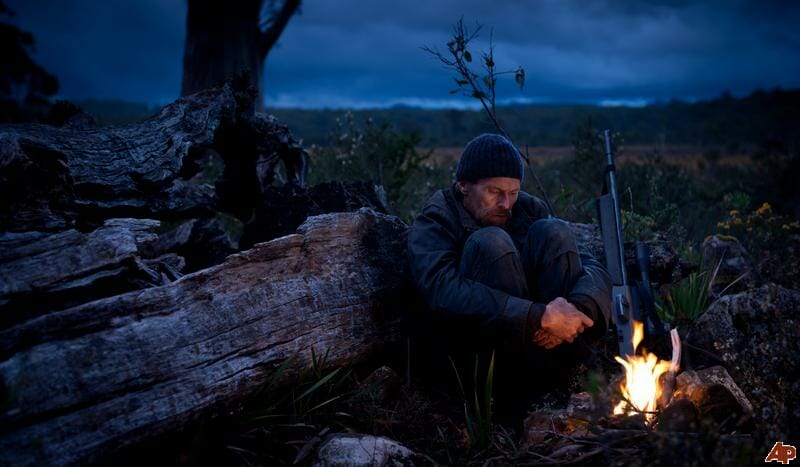
Though of a different genre, style and ideology, The Hunter parallels last year’s Drive in story and focus. Pensive and patiently paced, the film places an outsider in a perilous world where, amid a mission of crime, he entangles himself in the lives of a woman and her children, experiencing love and compassion for perhaps the first time. By film’s end, the tale has become a grand and gripping moral dilemma that, unlike Refn’s bleaker vision, plays out not as poetic justice but, instead, as divine grace.
A grave and grizzly Willem Dafoe plays the outsider—the Hunter—a loner named Martin hired by a pharmaceutical corporation to track down the last Tasmanian tiger. Martin, a skilled and ruthless marksman, takes the job like any other, but upon arriving on the Australian island of Tasmania, he realizes that something isn’t right: The family with whom he stays suffers in the aftermath of their father going missing. The island stands divided between greenies and loggers. The locals threaten his life. As he wades through these perils and complexities seeking to carry out his mission, Martin finds himself connecting with his host family and feeling sympathy for the widow and her fatherless children. This connection triggers a change within the cold criminal as he begins to see his life and circumstances through new eyes, calling into question everything—including the task at hand.
Director Daniel Nettheim juxtaposes the humanity that Martin experiences with the brutality of his expeditions in the forest. Whereas the home represents hope and life, particularly through a set of moving performances from Dafoe and child actors Morgana Davies and Finn Woodlock, the forest represents death and despair, specifically as visually conveyed by Nettheim. From the browns and grays of the natural landscape to the violent animal killings to the arrival of a fierce snow storm, such images reflect the conflict that plagues the island and its people, as well as Martin.
Given the premise and setting of The Hunter, Nettheim has every opportunity to turn his film into a political lecture about the preservation of nature; instead, he keeps the environmental issues secondary and focuses on the story at hand. In taking this approach, he moves beyond such issues to dig deeper into the core of the human condition, looking at both the depravity and redemption of man. Ironically, this in turn makes the political implications all the more pertinent because the narrative—and not some heavy-handed agenda—drives the film.
In exercising such restraint, Nettheim confirms himself a capable filmmaker with a veteran’s touch (though this is only his second feature film). The Hunter showcases Nettheim’s ability to tell a story effectively, grounding it in humanity, while also exhibiting the director’s real sense of scale visually, as he brings his tale to the screen with magnificence and grandeur. Excitingly, the young director also emerges as an optimist, giving us a buoyant and riveting finale that the similar—and dissimilar—Drive lacked.
Director: Daniel Nettheim
Writer: Alice Addison (screenplay), Wain Fimeri (original adaption), Julia Leigh (novel)
Starring: Willem Dafoe, Sam Neill, Frances O’Connor, Morgana Davies, Finn Woodlock
Release Date: April 6, 2012